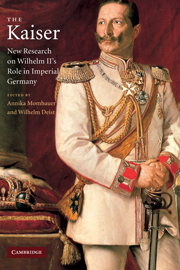Book contents
- Frontmatter
- Contents
- Notes on contributors
- Acknowledgements
- List of abbreviations
- Introduction
- Reflections on John Röhl: a Laudatio
- 1 Wilhelm II and ‘his’ navy, 1888–1918
- 2 Hollow-sounding jubilees: forms and effects of public self-display in Wilhelmine Germany
- 3 The Kaiser's elite? Wilhelm II and the Berlin administration, 1890–1914
- 4 Wilhelm, Waldersee, and the Boxer Rebellion
- 5 Dreams of a German Europe: Wilhelm II and the Treaty of Björkö of 1905
- 6 The uses of ‘friendship’. The ‘personal regime’ of Wilhelm II and Theodore Roosevelt, 1901–1909
- 7 Military diplomacy in a military monarchy? Wilhelm II's relations with the British service attachés in Berlin, 1903–1914
- 8 Wilhelm II as supreme warlord in the First World War
- 9 Germany's ‘last card’. Wilhelm II and the decision in favour of unrestricted submarine warfare in January 1917
- 10 Military culture, Wilhelm II, and the end of the monarchy in the First World War
- 11 Rathenau, Wilhelm II, and the perception of Wilhelminismus
- 12 Structure and agency in Wilhelmine Germany: the history of the German Empire – past, present, and future
- Index
9 - Germany's ‘last card’. Wilhelm II and the decision in favour of unrestricted submarine warfare in January 1917
Published online by Cambridge University Press: 24 July 2009
- Frontmatter
- Contents
- Notes on contributors
- Acknowledgements
- List of abbreviations
- Introduction
- Reflections on John Röhl: a Laudatio
- 1 Wilhelm II and ‘his’ navy, 1888–1918
- 2 Hollow-sounding jubilees: forms and effects of public self-display in Wilhelmine Germany
- 3 The Kaiser's elite? Wilhelm II and the Berlin administration, 1890–1914
- 4 Wilhelm, Waldersee, and the Boxer Rebellion
- 5 Dreams of a German Europe: Wilhelm II and the Treaty of Björkö of 1905
- 6 The uses of ‘friendship’. The ‘personal regime’ of Wilhelm II and Theodore Roosevelt, 1901–1909
- 7 Military diplomacy in a military monarchy? Wilhelm II's relations with the British service attachés in Berlin, 1903–1914
- 8 Wilhelm II as supreme warlord in the First World War
- 9 Germany's ‘last card’. Wilhelm II and the decision in favour of unrestricted submarine warfare in January 1917
- 10 Military culture, Wilhelm II, and the end of the monarchy in the First World War
- 11 Rathenau, Wilhelm II, and the perception of Wilhelminismus
- 12 Structure and agency in Wilhelmine Germany: the history of the German Empire – past, present, and future
- Index
Summary
Wer die See beherrscht, beherrscht auch den Handel, und wer den Handel beherrscht, dem gehören auch die Schätze der Welt und damit die Welt selbst.
Ernst Bassermann, National Liberal spokesman, during the Reichstag debate on the Second Navy Law in 1900The decision of the German government to launch a campaign of unrestricted submarine warfare in the waters around the British Isles in January 1917 was arguably the turning point of the First World War and certainly one of the main causes of Germany's collapse and defeat in 1918. It has been described in previous literature as the Reich Chancellor Theobald von Bethmann Hollweg's ‘darkest hour’ and as a ‘literal capitulation of political authority before the military in the most crucial issue of the entire [war]’. Alternatively, it has been portrayed as a desperate gamble determined by the ‘exorbitant war aims’ of German industry and agriculture; as the last chance to ‘repay’ London for its ‘starvation blockade’ of Germany; as a propaganda exercise designed to lift morale and combat ‘war weariness’ during the ‘turnip winter’ of 1916/17; and even as part of the ‘logic of total war … in both the material and moral senses’. But what role did Kaiser Wilhelm II play personally in the coming of unrestricted submarine warfare? How far did he share the optimistic assessment of his naval advisers that England would be brought to its knees within six months, as well as the popular desire for revenge against ‘Perfidious Albion’?
- Type
- Chapter
- Information
- The KaiserNew Research on Wilhelm II's Role in Imperial Germany, pp. 217 - 234Publisher: Cambridge University PressPrint publication year: 2003



